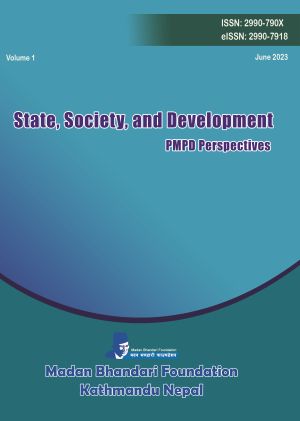Origin of People’s Multiparty Democracy from the Perspective of Patriotism
DOI:
https://doi.org/10.3126/ssd.v1i1.58473Keywords:
People's multiparty democracy, Communist Party, Patriotism imperialism, ExpansionismAbstract
Madan Bhandari’s theory of People’s Multiparty Democracy has evolved from a patriotic perspective amidst the intricacies of Nepali geopolitics and contemporary global political dynamics. This theory sheds light on the need-based causes and consequences in the development of PMPD, utilizing historical study as the methodological approach. In this article, the primary argument is in favor of the validity of PMPD within internal geopolitical realities and global political dynamics, considering the perspectives of contemporary Nepali national interests and patriotic values. However, the innovative spirit of Bhandari’s political philosophy has yet to be truly transformed into practice. Furthermore, the Communist Party of Nepal (Unified Marxist-Leninist) (CPN [UML]) has struggled to maintain a balance between its rhetoric and reality, given that PMPD serves as its guiding principle in Nepali politics. First, there is perplexity in analyzing the character of Nepali sovereignty accurately in the post-Bhandari era. Secondly, the CPN (UML) leadership still needs to exert efforts to advance the implementation of this philosophy. To substantiate the argument regarding the disparity between rhetoric and reality, circumstantial evidence is provided from political documents and statements made by prominent leaders, among others. The Nepali experience of the PMPD political philosophy is explored using qualitative research methodology.
Downloads
Downloads
Published
How to Cite
Issue
Section
License
Once published, an article in this Journal is not permitted to publish in other journals or similar publications without the permission of the Foundation. Contents and perspectives presented in the articles in the journal are solely of the authors.




